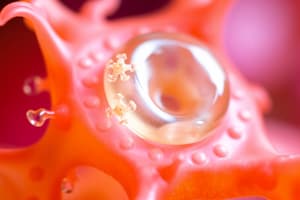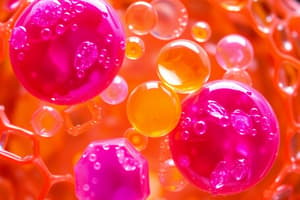Podcast
Questions and Answers
What is the primary focus of ecology?
What is the primary focus of ecology?
- The study of extinction rates of species.
- The conservation of specific biomes.
- The processing of nutrients in an ecosystem.
- The relationships between organisms and their environment. (correct)
Which of the following best illustrates the flow of energy in an ecosystem?
Which of the following best illustrates the flow of energy in an ecosystem?
- Nutrient cycling among soil bacteria.
- Population dynamics of a species.
- Food chains and food webs. (correct)
- Water circulation in a biome.
What effect do human activities have on ecological processes?
What effect do human activities have on ecological processes?
- They significantly impact various ecological processes. (correct)
- They have minimal effect compared to natural factors.
- They only affect biotic factors like species populations.
- They enhance natural selection without consequences.
In an ecosystem, which factors are considered abiotic?
In an ecosystem, which factors are considered abiotic?
Which process describes the interdependence of species in an ecosystem?
Which process describes the interdependence of species in an ecosystem?
What is the correct order of biological organization from simplest to most complex?
What is the correct order of biological organization from simplest to most complex?
Which structure is found in eukaryotic cells but not in prokaryotic cells?
Which structure is found in eukaryotic cells but not in prokaryotic cells?
What is the process called in which DNA is copied to produce two identical strands?
What is the process called in which DNA is copied to produce two identical strands?
How does natural selection influence evolution?
How does natural selection influence evolution?
What molecule carries the genetic information from parents to offspring?
What molecule carries the genetic information from parents to offspring?
Which of the following processes leads to the production of genetic variation in a population?
Which of the following processes leads to the production of genetic variation in a population?
What role do mitochondria play in a eukaryotic cell?
What role do mitochondria play in a eukaryotic cell?
Why is biodiversity significant for ecosystems?
Why is biodiversity significant for ecosystems?
Flashcards
What is ecology?
What is ecology?
The study of the relationships between organisms and their environments.
What is an ecosystem?
What is an ecosystem?
A community of living organisms and their physical surroundings.
What is energy flow?
What is energy flow?
The movement of energy through an ecosystem, illustrated by food chains and food webs.
What is nutrient cycling?
What is nutrient cycling?
Signup and view all the flashcards
What are biomes?
What are biomes?
Signup and view all the flashcards
What is the basic unit of life?
What is the basic unit of life?
Signup and view all the flashcards
What are prokaryotic cells?
What are prokaryotic cells?
Signup and view all the flashcards
What are eukaryotic cells?
What are eukaryotic cells?
Signup and view all the flashcards
What are genes?
What are genes?
Signup and view all the flashcards
What is DNA replication?
What is DNA replication?
Signup and view all the flashcards
What is evolution?
What is evolution?
Signup and view all the flashcards
What is biodiversity?
What is biodiversity?
Signup and view all the flashcards
Study Notes
Biological Organization
- Biology is the scientific study of life, encompassing a vast array of organisms and their interactions.
- Key characteristics of life include organization, growth, reproduction, response to stimuli, adaptation, and energy processing.
- Biological organization progresses from atoms to ecosystems, increasing in complexity. Individual atoms combine to form molecules, molecules to form organelles, organelles to form cells, cells to form tissues, tissues to form organs, organs to form organ systems, organ systems to form organisms, organisms to populations and communities, and ultimately to ecosystems.
The Cell: The Fundamental Unit of Life
- Cells are the fundamental structural and functional units of all living organisms.
- All cells share common features: a plasma membrane, cytoplasm, and genetic material (DNA).
- Prokaryotic cells lack a nucleus and membrane-bound organelles.
- Eukaryotic cells possess a nucleus and membrane-bound organelles, enabling compartmentalization of cellular functions.
- Specialized organelles, like mitochondria (energy production) and chloroplasts (photosynthesis), perform critical roles within the cell.
- Cell division (mitosis and meiosis) is essential for growth, repair, and reproduction.
Genetics and Heredity
- Genetics studies genes, heredity, and variation in living organisms.
- Genes are DNA segments encoding protein synthesis instructions.
- DNA transmits genetic information from parents to offspring.
- DNA replication ensures accurate genetic duplication.
- The central dogma of molecular biology describes DNA's transcription into RNA, then RNA translation into proteins.
- Mutations alter DNA sequences, potentially affecting organism traits.
- Genetic diversity is vital for species adaptation and evolution.
Evolution and Biodiversity
- Evolution involves gradual changes in inherited traits within biological populations over generations.
- Natural selection drives evolution by favoring traits increasing survival and reproduction.
- Biodiversity encompasses Earth's life variety at all levels, from genes to ecosystems.
- Biodiversity is crucial for ecosystem stability and human-essential services.
- Extinction shapes biodiversity, and threats like habitat loss and climate change increase extinction rates.
Ecology
- Ecology studies relationships between organisms and their environment.
- Ecosystems encompass all living organisms (biotic factors) and their physical environment (abiotic factors).
- Key ecological concepts include energy flow, nutrient cycling, and population dynamics.
- Food chains and webs illustrate energy flow through ecosystems, with producers, consumers, and decomposers playing varying roles.
- Biomes and habitats refer to large-scale regions with specific climates and associated organisms.
- Human impact significantly affects ecological processes.
- Interactions like competition, predation, and symbiosis influence populations within ecosystems.
Studying That Suits You
Use AI to generate personalized quizzes and flashcards to suit your learning preferences.




